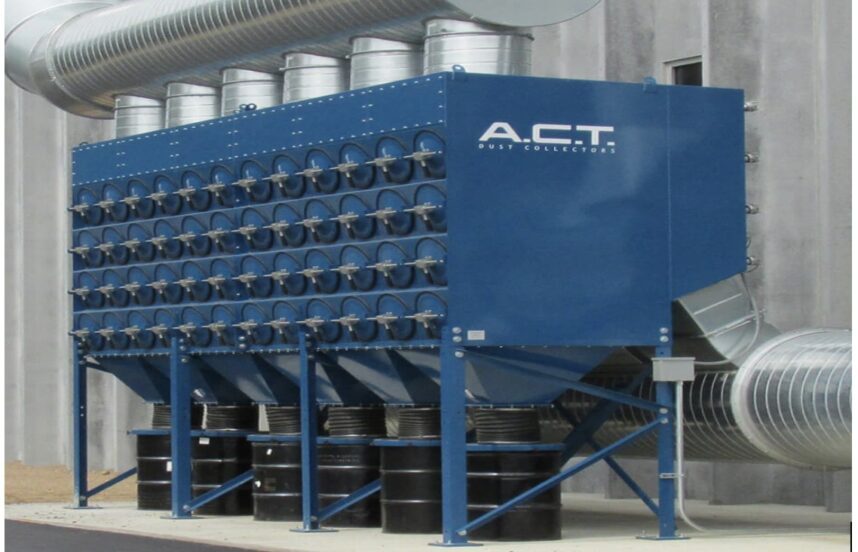Both baghouse filters and cartridge filters are vital tools for industrial air cleaning. Each type has unique structural features, roles, and benefits, depending on their specific application. This article explores their distinct characteristics.
Dust Collector Cartridge Filters
Cartridge filters are essential for cartridge-based industrial dust collectors. These systems pull dust-filled air through cylindrical cartridge filters, capturing dust on the filter’s outer surface. Accumulated dust is periodically cleaned off using a pulse-jet system, maintaining filter efficiency and steady airflow. The ejected dust collects in a designated system for disposal or reuse.
Dust cartridge filters offer flexibility with various efficiencies and media types, making them applicable for diverse dust collection needs.
Design
Shaped cylindrically, cartridge filters are more compact compared to bag filters. Their pleated design allows a large filter area in a smaller volume, making cartridge systems generally smaller than equivalent baghouse systems.
Media/Materials
Cartridge filters utilize sophisticated materials including pleated cellulose, spunbond polyester, cellulose/poly blends, nanofiber, and PTFE-coated media. Options for oleophobic, anti-static, or flame-retardant treatments enhance their adaptability across various industries.
Cleaning Mechanism
A pulse-jet system is commonly employed, where compressed air blasts dust from the filter’s surface into a collection system.
Applications
Ideal for handling fine dust with high filtration needs, cartridge filters are used in industries like metalworking, food processing, and pharmaceuticals.
Advantages
Their compact structure requires less space, enabling smaller, more energy-efficient systems. They are easier to replace and manage, with a variety of media types catering to different applications.
Baghouse Filters (Fabric Filters)
Baghouse filters, or fabric filters, operate within baghouse-style dust collectors, where air flows through long fabric bags, trapping dust outside. Accumulated dust is removed through mechanical shaking or reverse airflow, collecting in a hopper for removal.
Design
These filters are typically long, fabric-based, and hang vertically in a large enclosure, with some variations in shape and size depending on the dust collector type.
Media/Material
Materials like cotton, polyester, aramid, and fiberglass are used, often treated to enhance performance and durability.
Cleaning Mechanism
Dust cakes on the exterior are periodically cleaned by reverse airflow or mechanical shaking, settling into a hopper for removal.
Applications
Suited for very high air volumes and temperatures, baghouses are commonly used in cement production and power generation.
Advantages
They manage high dust loads and are suitable for large-scale industrial environments, available in various fabric options.
Cartridge Filters vs Baghouse Filters
Choosing between cartridge and baghouse filters depends on the dust type, volume, space, filtration needs, and budget.
Filtration Efficiency
Cartridge filters generally provide higher filtration efficiency, especially for fine dust, thanks to their pleated design.
Footprint
Cartridge systems are more space-efficient, ideal for limited spaces.
Maintenance
Cartridge filters are simpler to replace, often not requiring tools or entry into the filter chamber, reducing maintenance time and costs.
Longevity
While bag filters may last longer in certain conditions, modern cartridge filters with advanced media offer extended durability.
Cost
Though bag filters may be less costly per unit, the overall benefits of cartridge systems can outweigh these initial savings.
Looking for High-Quality Dust Collector Filters?
Atmax Filtration stocks a comprehensive the first choice cartridge air filters and baghouse filters, compatible with various dust collector models.
Contact an Atmax Filtration specialist today for more information!
For more information write to us at sales@atmaxfiltration.com or call us at +1 (816)-745-9994

